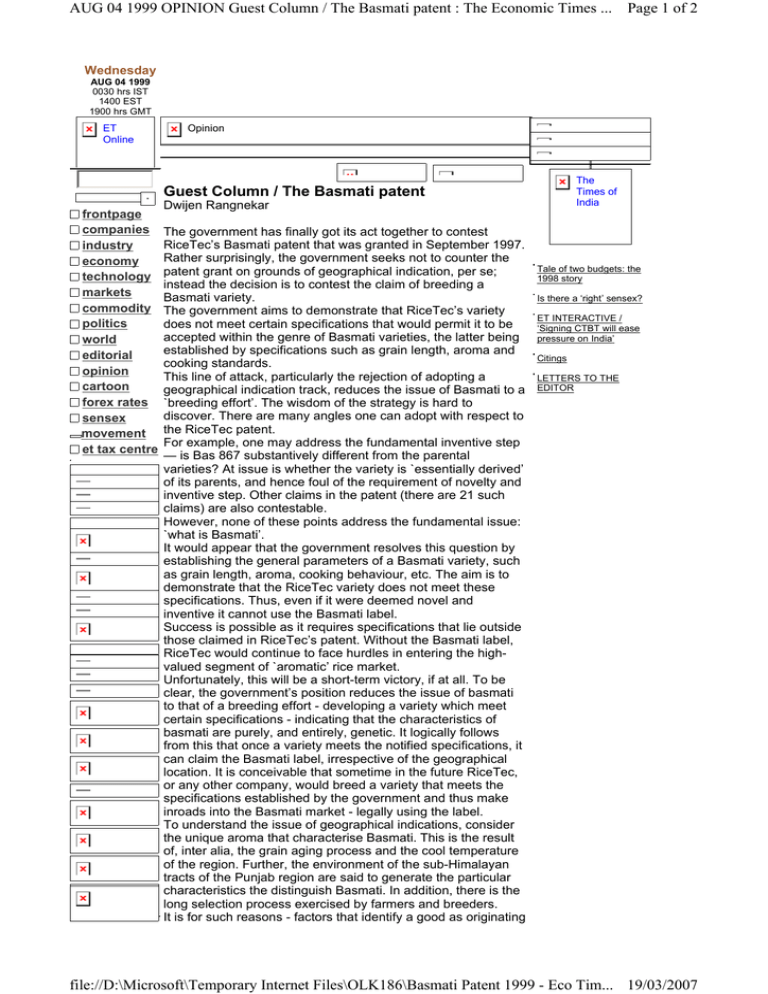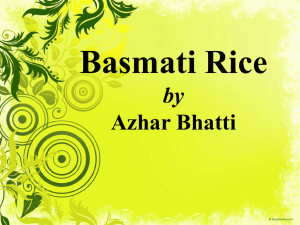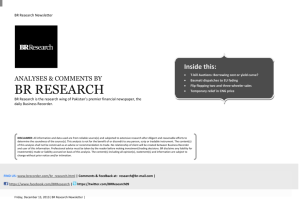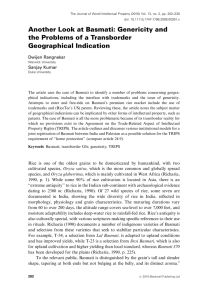Guest Column / The Basmati patent
advertisement

AUG 04 1999 OPINION Guest Column / The Basmati patent : The Economic Times ... Page 1 of 2 Wednesday AUG 04 1999 0030 hrs IST 1400 EST 1900 hrs GMT ET Online Opinion The Times of India Guest Column / The Basmati patent frontpage companies industry economy technology markets commodity politics world editorial opinion cartoon forex rates sensex movement et tax centre Dwijen Rangnekar The government has finally got its act together to contest RiceTec’s Basmati patent that was granted in September 1997. Rather surprisingly, the government seeks not to counter the patent grant on grounds of geographical indication, per se; instead the decision is to contest the claim of breeding a Basmati variety. The government aims to demonstrate that RiceTec’s variety does not meet certain specifications that would permit it to be accepted within the genre of Basmati varieties, the latter being established by specifications such as grain length, aroma and cooking standards. This line of attack, particularly the rejection of adopting a geographical indication track, reduces the issue of Basmati to a `breeding effort’. The wisdom of the strategy is hard to discover. There are many angles one can adopt with respect to the RiceTec patent. For example, one may address the fundamental inventive step — is Bas 867 substantively different from the parental varieties? At issue is whether the variety is `essentially derived’ of its parents, and hence foul of the requirement of novelty and inventive step. Other claims in the patent (there are 21 such claims) are also contestable. However, none of these points address the fundamental issue: `what is Basmati’. It would appear that the government resolves this question by establishing the general parameters of a Basmati variety, such as grain length, aroma, cooking behaviour, etc. The aim is to demonstrate that the RiceTec variety does not meet these specifications. Thus, even if it were deemed novel and inventive it cannot use the Basmati label. Success is possible as it requires specifications that lie outside those claimed in RiceTec’s patent. Without the Basmati label, RiceTec would continue to face hurdles in entering the highvalued segment of `aromatic’ rice market. Unfortunately, this will be a short-term victory, if at all. To be clear, the government’s position reduces the issue of basmati to that of a breeding effort - developing a variety which meet certain specifications - indicating that the characteristics of basmati are purely, and entirely, genetic. It logically follows from this that once a variety meets the notified specifications, it can claim the Basmati label, irrespective of the geographical location. It is conceivable that sometime in the future RiceTec, or any other company, would breed a variety that meets the specifications established by the government and thus make inroads into the Basmati market - legally using the label. To understand the issue of geographical indications, consider the unique aroma that characterise Basmati. This is the result of, inter alia, the grain aging process and the cool temperature of the region. Further, the environment of the sub-Himalayan tracts of the Punjab region are said to generate the particular characteristics the distinguish Basmati. In addition, there is the long selection process exercised by farmers and breeders. It is for such reasons - factors that identify a good as originating Tale of two budgets: the 1998 story Is there a ‘right’ sensex? ET INTERACTIVE / ‘Signing CTBT will ease pressure on India’ Citings LETTERS TO THE EDITOR file://D:\Microsoft\Temporary Internet Files\OLK186\Basmati Patent 1999 - Eco Tim... 19/03/2007 AUG 04 1999 OPINION Guest Column / The Basmati patent : The Economic Times ... Page 2 of 2 in a particular region or locality where a given quality, reputation or range of characteristics is said to be associated that Basmati is uniquely associated with the Punjab. For that matter, in the UK, there are stringent standards on the use of the label Basmati - only long grain aromatic rice grown in the Punjab regions of India and Pakistan can use the label. Similarly, in Saudi Arabia, American long grain, aromatic rice is not permitted to use the Basmati indication. Hence, one worries at the reticence of the government on this matter. The point being made concerns whether the Basmati is generic or geographic: can Basmati be developed, bred and cultivated anywhere or is it exclusive to a particular region? At the WTO there are provisions to ensure that geographical indications do not mislead the public about the origins of a product or of the quality of the product. A number of countries have adopted legislation to protect particular products - the most popular being Champagne in France and Scotch in the UK. There is need to take a proactive stance in identifying a range of Indian products that require protection under geographical indications. This is urgently required not only because of the RiceTec patent but also since Kenya is said to have outstripped India in exporting Darjeeling tea!# The task ahead is difficult. Not only must the patent battle be fought shrewdly, but the matter needs to be taken to other multilateral forums -- the WTO and the Convention on Biological Diversity. Other Websites The Times of India | Femina | Filmfare | Times Classifieds | Property Times Education Times | India Times | Response Service | Tween Times For reprint rights: Times Syndication Service Disclaimer file://D:\Microsoft\Temporary Internet Files\OLK186\Basmati Patent 1999 - Eco Tim... 19/03/2007




